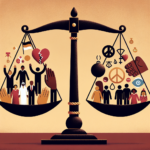
Introduction
Have you ever felt overwhelmed by your emotions, as if they were controlling you rather than the other way around? You’re not alone. In our fast-paced, often chaotic lives, emotional turbulence can be a common experience. Yet, understanding the power of emotional regulation and learning how to take control of your feelings can transform your life, enhance your relationships, and improve your mental health.
In this article, we explore the multifaceted nature of emotional regulation, provide real-world case studies, present actionable strategies, and answer some common questions, helping you harness the undeniable power of emotional regulation.
What is Emotional Regulation?
Emotional regulation refers to the process of managing your emotional experiences and reactions. It involves both the ability to suppress unwanted emotions and the ability to evoke desired ones at appropriate times. Whether it’s anger, sadness, or excitement, emotional regulation is a key skill that affects every facet of our lives.
The Relevance of Emotional Regulation
Emotional regulation is not just a skill but a crucial element of well-being. Research shows that effective emotional regulation can lead to better mental health, improved relationships, and greater success in various life domains. By understanding The Power of Emotional Regulation: How to Take Control of Your Feelings, you can lay the groundwork for a happier and more fulfilling life.
The Science Behind Emotional Regulation
The Brain and Emotions
Emotions originate in the brain, predominantly in the limbic system. However, the prefrontal cortex plays a crucial role in emotional regulation. This area of the brain is responsible for decision-making, planning, and social behavior. Understanding this can give us insights into why some people struggle with emotional regulation while others thrive.
Table 1: Brain Areas Involved in Emotional Regulation
| Brain Region | Function |
|---|---|
| Limbic System | Processes emotions and memories |
| Prefrontal Cortex | Involved in decision-making and emotional control |
| Amygdala | Processes fear and pleasure-related responses |
| Anterior Cingulate | Regulates emotional reactions and decision-making |
The Impact of Poor Emotional Regulation
Lack of emotional regulation can lead to various negative outcomes, such as anxiety, depression, and even physical health issues like heart disease. Conversely, those who master the art of emotional regulation often experience improved relationships, enhanced performance at work, and better overall health.
Case Study: Emotional Regulation in the Workplace
Consider the case of “Alice,” a mid-level manager at a tech company. Alice often found herself overwhelmed at work, leading to bursts of anger directed at her team during stressful periods. This not only affected her relationships with coworkers but also hampered her team’s productivity.
After participating in an emotional intelligence workshop, Alice learned about emotional regulation strategies. She started practicing mindfulness and employing techniques like “counting to ten” before reacting emotionally. Within months, Alice noticed a significant positive change in her relationships and team morale. This case illustrates The Power of Emotional Regulation: How to Take Control of Your Feelings and its profound impact on workplace dynamics.
Strategies for Effective Emotional Regulation
1. Mindfulness and Meditation
Practicing mindfulness allows you to observe your thoughts and emotions without judgment. Meditation can serve as a grounding tool, helping you to recenter yourself when emotions spiral out of control.
2. Cognitive Reframing
Cognitive reframing involves altering your perception of a situation. By viewing challenges as opportunities for growth, you empower yourself to manage your emotions effectively.
3. Breathing Techniques
Simple breathing exercises can reduce stress and help you regain composure. The 4-7-8 technique, where you inhale for 4 seconds, hold for 7, and exhale for 8, can quickly calm your nervous system.
Chart 1: Breathing Techniques for Emotional Regulation
| Technique | Steps | Benefits |
|---|---|---|
| 4-7-8 Breathing | Inhale 4s, Hold 7s, Exhale 8s | Reduces anxiety and stress |
| Box Breathing | Inhale 4s, Hold 4s, Exhale 4s, Hold 4s | Increases focus and relaxation |
| Diaphragmatic Breathing | Belly breathing with emphasis on full inhalation | Improves oxygen intake and calmness |
4. Journaling
Writing down your feelings can offer profound insights and clarity. Reflecting on your emotions can help you identify triggers and develop coping strategies, thereby enhancing your emotional regulation capabilities.
5. Seeking Support
Sometimes, talking to a trusted friend or mental health professional can provide the external perspective needed to manage your emotions effectively.
The Role of Emotional Regulation in Relationships
Enhancing Communication
Emotional regulation plays a critical role in interpersonal relationships. Effective emotional regulation can lead to clearer and healthier communication, reducing misunderstandings and fostering deeper connections.
Case Study: The Power of Emotional Regulation in Romantic Relationships
Take “John” and “Mary,” a couple facing frequent arguments stemming from misunderstandings. After they both read about emotional regulation strategies, they decided to communicate more openly about their feelings. They practiced active listening and made a conscious effort to validate one another’s emotions. As a result, their conflicts diminished, and they cultivated a supportive partnership. This highlights The Power of Emotional Regulation: How to Take Control of Your Feelings not just individually but within the context of relationships.
Emotional Regulation and Mental Health
A Key Component of Therapy
For many therapists, emotional regulation is a core focus. Techniques such as Dialectical Behavior Therapy (DBT) specifically address emotional regulation and are effective for individuals struggling with intense emotions.
Table 2: Emotional Regulation Strategies Used in Therapy
| Therapy Method | Key Techniques |
|---|---|
| Cognitive Behavioral Therapy (CBT) | Cognitive restructuring, emotion diary |
| Dialectical Behavior Therapy (DBT) | Mindfulness, distress tolerance |
| Acceptance and Commitment Therapy (ACT) | Acceptance, value-driven action |
Case Study: Therapy and Emotional Regulation
“Sarah,” who battled anxiety and depressive episodes, sought therapy to gain control over her emotional responses. Through CBT, she learned to challenge her negative thoughts and implement emotion regulation strategies. Over time, Sarah reported feeling more balanced and capable of handling life’s ups and downs. This transformation underscores The Power of Emotional Regulation: How to Take Control of Your Feelings in the context of mental health.
The Long-Term Benefits of Emotional Regulation
Personal Growth
Mastering emotional regulation fosters resilience and adaptability. You’ll find that you can handle life’s challenges more effectively, turning setbacks into opportunities for growth.
Longevity and Health
Research has shown that better emotional regulation is correlated with a lower risk of chronic diseases. By managing stress better, you not only enhance mental health but improve your overall well-being.
Conclusion
In today’s complex world, having control over your emotions is paramount. The Power of Emotional Regulation: How to Take Control of Your Feelings can fundamentally alter your experiences, relationships, and mental state. Remember, emotional regulation is a skill that can be developed with practice, patience, and persistence.
As you embark on this journey toward emotional mastery, take actionable steps: cultivate mindfulness, journal your thoughts, and communicate openly. With time and commitment, you can harness the power of emotional regulation to create a more balanced, fulfilling life.
FAQs
1. What is emotional regulation?
Emotional regulation is the ability to manage and respond to emotional experiences in a healthy way.
2. Why is emotional regulation important?
Effective emotional regulation can lead to improved mental health, better relationships, and enhanced overall well-being.
3. Can emotional regulation be learned?
Absolutely! Like any skill, emotional regulation can be developed through various techniques and practices, such as mindfulness and cognitive reframing.
4. How can I improve my emotional regulation?
You can improve by practicing mindfulness, journaling, seeking support, and utilizing breathing techniques.
5. What role does therapy play in emotional regulation?
Therapy often focuses on developing emotional regulation strategies, providing tools to help individuals manage their feelings effectively.
Embrace the power of emotional regulation and take control of your feelings today!















